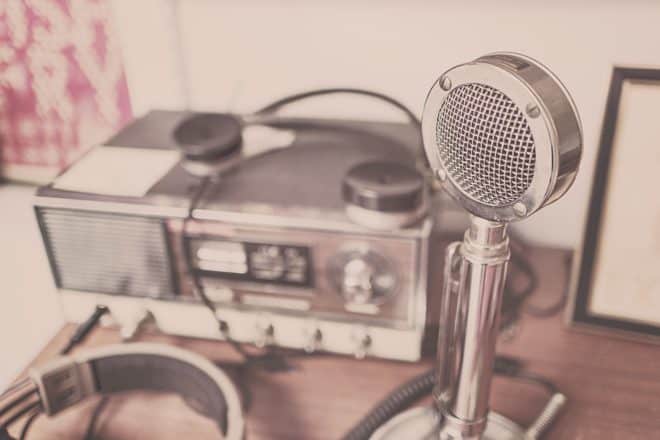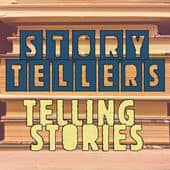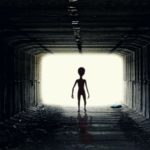Podcast Spotlight: Storytellers Telling Stories


The podcast vs. radio comparison is played out, as is the cries for the demise of radio. Instead, I like to think of it more as an evolution and in many ways, complimentary formats. The proliferation of audio drama and fiction podcasts is clear evidence podcasting isn’t just two guys telling each other inside jokes in their basement. Another podcast pushing this evolution is Storytellers Telling Stories — a podcast with their DNA woven from old radio theater segments.
Storytellers Telling Stories labels itself much more succinctly than I could, “A podcast harkening back to the Golden Age of Radio, creating a “theatre of the mind” with writers, actors, and musicians.” A more surprising departure from some of their audio drama-esque counterparts, Storytellers Telling Stories is episodic. You can jump in wherever you’d like and when you have the time. The episodes range from just a few minutes to about an hour with most hovering around the 30-minute mark.
We were fortunate to meet Jude Brewer, creator and host of Storytellers Telling Stories, to discuss the podcast, challenges being an indie podcaster (spoiler: it’s time.), and where the podcast is headed. See below for our Q&A.
Listen: Apple Podcasts | Stitcher | Spotify
DISCOVER PODS: How’d you get into podcasting?
JUDE: I fell into it by accident. Roughly two years ago, a few friends of mine and I started watching films and recording our discussions. We began with Brazil, Being John Malkovich, even throwing Small Soldiers in there for fun, then some more friends joined in and we topped off around eight episodes. I was doing all the editing, and because I tend to get bored easily I tried finding new ways to layer audio clips from the films throughout our discussions. It was an experiment that benefitted largely from years of making music on my computer between writing books. The film podcast went on an indefinite hiatus, but I felt like there was still more for me to explore in podcasting.
DP: In your own words, why should listeners tune in to Storytellers Telling Stories?
JUDE: For anyone who enjoys laying in the dark and closing their eyes and pretending they’re somewhere else — I know that’s kind of specific and probably isn’t how most people are listening to the show, but that’s how I approach each episode in the studio. I grew up with a Sony Walkman, and I loved scanning CD album covers at the store then buying whichever CD had the most interesting artwork. Then I’d go home and open the lyric booklet and listen to the album twice-though from start to finish, and there were some CDs that felt like they were hiding larger stories. As a teenager, I used to try and write my novels with the CDs serving as a rough story outline. So, if you’re weird like me then maybe you should tune-in.
DP: Your podcast fits nicely into the radio vs. podcasting discussion. Where do you think we’re headed there?
JUDE: I’ve never been at the top of any sort of industry or medium, and I’m far from being any kind of insider — in most ways, I’m still that kid with his eyes closed trying to discover something no one else sees, and I’d wager that’s the case for “where we’re headed” as well. The radio was never a source of entertainment for me–morning shows, talk radio, all of it was just noise. I was too busy writing books and screenplays and dreaming of directing movies. Then I’d hear a grown-up reminisce about the Golden Age of Radio when they’d lay on the floor and listen to old westerns or mysteries or scary stories. In some way, I’m still just trying to direct movies, and podcasting is one way of doing it. And that’s really where we’re headed. A podcast can be produced for next-to-nothing from the comfort of your couch, delivered to an infinite number of listeners on their couches. We’re living out the new Golden Age of Stories.
DP: What stories should new listeners start with?
JUDE: Season 2: Episode 4 — “Lifestyles of the Unrich and Nonfamous” — Brianna Barrett is one of those performers that really knocks your socks off the first time you see her on stage. I had the immense fortune of watching an hour-long one-woman-show of hers, then I got to see another. Both performances were completely different and equally as engaging. Getting to capture just a small bit of her storytelling was one of my most satisfying experiences on the show so far. Plus, you’ll get to hear a song from Haley Johnsen that really drives some central themes of that story home.
We have a lot of weird episodes. I like weird stuff. Unsettling, eerie, creepy, sad. I try and balance those out with episodes like Brianna’s, or Rick Hall from S2:Ep.1, or Kate Ristau from S1:Ep.1.
The weirdest departure we’ve taken so far is with S2: Episode 6 — “Blue Lips & Bloodstains” — Stephanie Strange is a musician and a writer, and she came to me with four short stories and two songs. We blended these together by reversing some of the musical tracks, and it wound up sounding like some experimental EP about working at a cafe and grappling with an unexpected death.
DP: What’s the biggest challenge you face as an indie podcaster?
JUDE: Time. There is never enough of it. And until I discover that hidden day of the week, Chronos and I will be at odds.
DP: Where do you want to take your podcast?
JUDE: There are some things regarding the future of the podcast that I can’t talk about right now, but I will say that I’m always searching for that voice I’ve never heard before. Or that song I didn’t know I needed. This show could benefit from having more constraints in its format, even some sort of theme. Season 2 began with a prompt: “endings”, and each storyteller did their thing, then I’d tell the musicians what the story was roughly about and they’d play their song, and so far the stories and the songs have matched up perfectly. But I’m really just improvising at a break-neck pace. Who knows what the future holds? That bastard Chronos sure does.
DP: What other podcasts are you listening to now?
JUDE: I don’t tend to listen to shows resembling my own, and I often wonder if that’s a downside or not. Either way, my current favorites are Last Podcast on the Left, Reply All, Criterionauts, Darknet Diaries, How Did This Get Made?, Penn’s Sunday School, Abe Lincoln’s Top Hat…that should give some indication of what I listen to.
DP: Anything else you’d like to add?
JUDE: I cannot stress this enough: if there is an artist you enjoy, seek them out and let them know. It will mean the world to them. If there is a writer on our show you enjoyed or a musician that elicited a feeling from you, then you should like their stuff, share it with everyone you know, and maybe even stalk them on social media and remind them that what they’re doing is important. Artists doubt themselves constantly, and in this day and age, even with how much more accessible it is to create art, you will inevitably doubt your existence or at least the legitimacy of it. Tell people you matter to them. That’s all.













Comments
Comments are closed.